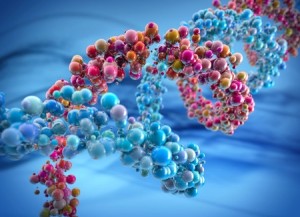Researchers at the University of Texas Austin have announced that they found “convergent evidence” of gene networks related to alcohol consumption in humans. “These networks of coordinately expressed gene sets with common biological functions provide a systems level model of alcohol dependence.” But it would be wrong to conclude, as the Digital Journal did that: “Researchers at the University of Texas Austin successfully identified a genetic network which appears to determine alcohol dependence.” Other news outlets, such as Fox News, said something similar. This is another example of how the media reporting on research runs ahead of the research itself.
But the researchers themselves didn’t make the same mistake. The WCAAR newsletter from the University of Texas Austin, which was cited above, said: “The purpose of this study was to arrive at a comprehensive picture of the gene sets driving the phenotype of alcohol dependence.” They hoped the gene networks they identified could be useful as a reference for future studies, “such as exploration of specific drug targets in the network or identification of new gene isoforms unique to humans.”
The study consisted of doing post mortem biopsies of the prefrontal cortex brain tissues of two groups of individuals—alcoholics and non-alcoholics. They discovered that at a global level, gene connectivity, “representing fully functional biological processes,” was weaker within the alcoholic group. “This dysregulation of normal biological function is a hallmark of alcohol dependence.” Looking at the abstract for the published study in Molecular Psychiatry, the team of researchers said:
Overall, our work demonstrates novel convergent evidence for biological networks related to excessive alcohol consumption, which may prove fundamentally important in the development of pharmacotherapies for alcohol dependence.
The problem seems to have been that the news outlets were attributing causation to what is at this stage of the research only a correlational finding. Here is a short video of Ionica Smeets explaining the difference between correlation and causation; and the dangers of confusing correlation for causation. In her talk she said: “Jumping to an incorrect conclusion about causality when you see a correlation, is the most often made logical mistake.”
This was a study of the brain tissue of dead alcoholics and non-alcoholics. The post mortem presence of the gene networks was suggestive of a possible predisposing genetic factor for alcoholism, but could not said to be causative. “This strong interconnectedness of gene networks linked to alcohol dependence was absent in the control tissue.”
The alcohol consumption networks in the alcoholic tissue suggest subtle transcriptome reorganization in response to alcohol dependence. They may also indicate an allostatic mechanism – a physiological process to regain homeostasis – to overcome changes associated with alcohol dependence.
An alostatic mechanism refers to “the wear and tear” or physiological consequences of chronic exposure to heightened neural or neuroendocrine response that is the result of chronic stress—in this case from the lifelong consumption of large amounts of alcohol. So the researchers are suggesting their results indicate the presence of “a physiological process to regain homeostasis”—an attempt by the brains of the alcohol dependent individuals “to overcome changes associated with alcohol dependence.” They see adaptation, but not necessarily causation.
Alcohol dependence runs in families, and is suggestive of genetic causality, but not conclusively so. The Addiction Science Research and Education Center of the University of Texas Austin noted that while alcoholism runs in families and is suggestive of a genetic cause, many things run in families that aren’t genetic, such as speaking Spanish. Although twin and adoption studies indicate susceptibility for alcohol dependence in families, there are some individuals like Jay Joseph who question the scientific validity of twin studies (See “Chasing Ghosts” and “Troubling Twin Studies“). But even Erickson fails to make a causal link between genetics and alcoholism:
Alcohol dependence is not a genetic disease (which suggests destiny); rather, the tendency to become alcoholic is inherited. Thus alcoholism can skip generations, or affect only certain individuals in an alcoholic family. (number 103 of the Alcohol Facts)
An earlier theory of the “cause” of alcoholism was the “THIQ theory.” As Carleton Erickson indicated in his list of “Drug Myths,” the THIQ is an older myth popular in the early 1970s that when alcoholics drink they form opiate-like THIQs in the brain, to which they become “addicted.” There is a short, but helpful description of the THIQ myth on the HAMS Network. I don’t agree with much of what is there about addiction and recovery, as I have a 12 Step, abstinence-based approach to recovery, where they are harm reduction-based. But this seems to be a balanced summary of what is now a discarded theory.
So while there is growing evidence of some kind of genetic connection with alcoholism, that connection is not conclusive at this point in time. Nor can it be said to be causative. And if or when it becomes more conclusive, it seems that a better way of describing it is not as a genetic disease, but an inherited tendency. So the expressed hope of the study’s findings by its researchers can be anticipated, namely that it “may prove fundamentally important in the development of pharmacotherapies for alcohol dependence.” But it doesn’t provide evidence for a genetic cause of alcohol dependence.

